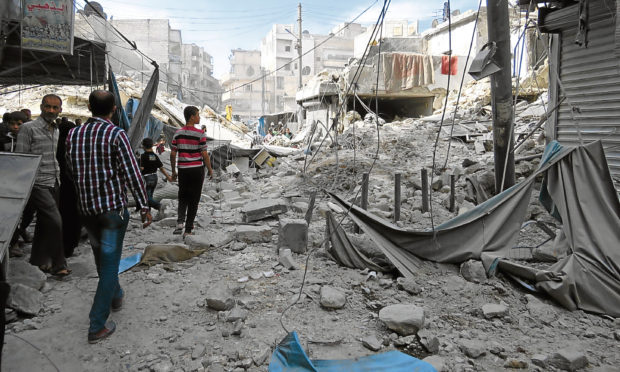For a story to hold the imagination, it needs to be simple.
Our minds absorb news in a pattern — a beginning, a middle and an expected end.
Unconsciously, this is how we process the world.
The war in Syria is not simple and breaks the rules of story telling.
For a long time it was “good” – holding the line in a fractious Middle East.
Then President Assad was “bad” for resisting a popular uprising.
Then the uprising became “bad”, as it was a vehicle for fanatical insurgents under the Isis banner.
Yet non-fanatical people were also fighting to overthrow a dictatorial regime, as well as fighting Isis.
Foreign forces became involved, ostensibly united in the fight against fanatics.
However, Russia’s contribution was interpreted by the West as a cover for acquiring regional influence.
Moscow has stood in support of Assad and blocked UN moves to have him deposed.
Since September 2015 Russia has been targeting both Isis and anti-Assad revolutionaries.
The charge sheet against President Putin of Russia includes alleged war crimes, with aid organisations and hospitals claiming they have been deliberately bombed.
Syria is far from simple, which is perhaps why world outrage is muted – we haven’t got a straightforward tale to motivate our anger.
The alternative is that Syria is part of a broader phenomenon, whereby complexity and messy stories blur our moral focus.
It was not straightforward for the West to assist the Arab Spring rising in Syria because President Assad was an ally.
Former Prime Minister Tony Blair had wanted to give Assad an honorary knighthood in 2002, when the Syrian leader visited the UK and met with the Queen and political leaders.
Despite the UK knowing that Assad allowed terrorists to operate from Syrian territory, it was more important to recruit him to the alliance against Saddam Hussein.
This realpolitik compromised the West – it should have been tackling terrorism in all states, not inventing threats from Iraq.
The 2003 invasion of Iraq undermined Western citizens’ faith in the judgement of the political class.
Britain would go on to assist in Libya’s revolution but when the then-Prime Minister David Cameron sought parliament’s approval to intervene in Syria in 2013, he lost the vote.
It wasn’t just public faith which had diminished but military capacity – given the aftermath of both Iraq, Libya and Afghanistan, it is not clear that the UK has the ability to fight foreign wars.
Another vote in 2015 sanctioned British war planes to fly alongside US ones to help the revolutionaries but it is not clear what this has achieved.
Shock at the ruthless tactics of Russia led to an emergency debate in the House of Commons this week.
The demand was for no-fly zones, patrolled by the US and UK, to stop further atrocities.
However, Foreign Secretary Boris Johnson said such a policy might have unwanted consequences: “We cannot commit to a no-fly zone unless we are prepared to confront and perhaps shoot down planes or helicopters that violate that zone.
“We need to think very carefully about the consequences.”
It is a sensible observation – and one suspects, valid for all such future situations and Britain’s ability to intervene.
The UK simply doesn’t have the power any more to be of much significance in global conflicts.
Johnson’s words have another meaning – that Russia is unpredictable and bullish.
President Putin in Moscow seems keen on a policy of global disruption – intervening in Syria, hacking US websites and advocating Brexit.
What is this story – Russian resurgence or a return to the Cold War?
Johnson was not all good sense. He said Britons should protest outside the Russian Embassy in London and demand Russia be held accountable for war crimes.
It is not for senior cabinet members to urge popular protests on the streets – indeed, that’s the kind of politics Britain is meant to resist.
In December 2015 he was advocating Britain work alongside Russia and President Assad against Isis.
And this too is hard to process – a British Foreign Secretary appointed after openly contradicting the Government’s policy – another example of Britain’s international reputation playing out as a comedy.
This is the wider issue, the erosion of old assumptions about Britain and the West.
How are we to make sense of the world where the threat is from nations riven by self-interest when we are pursuing chasing our own nationalist goal in Brexit?
The same applies to the popularity of Trump – US nationalism at its worst.
It was easier to understand events when our own democracies and economies seemed fair and stable.
When our own values are so challenged and the integrity of our political structures brought into question, our references for how the rest of the world should behave are lost.
We are not as outraged as the awful tragedy of Syria deserves because we have no clear sense how we want the story to end.
If we did intervene and by some miracle brought peace, then on who’s behalf?
We have lost the narrative thread on world affairs and become characters in an authorless tale.
